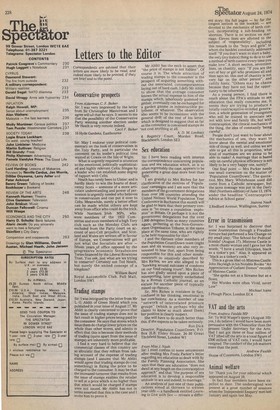Trading stamps
Sir: I was intrigued by the letter from Mr L. G. Ablitt of Green Shield which you published in your issue of August 17. Mr Ablitt is clearly concerned to prove that the issue of trading stamps does not in fact result in higher prices being paid by the consumer. He says that stores which issue them do charge lower prices on the whole than other stores, and admits in effect that this is because their methods of trading (quite apart from the issue of stamps) are inherently more profitable.
I find it very hard to believe that the commercial classes of this country are so altruistic that they refrain from taking account of the expense of trading stamps (and I assume that Mr Ablitt would agree that trading stamps do cost something) in fixing the price to be charged to the consumer. It may be that the increased turnover that results from the issue of stamps enables the retailer to sell at a price which is no higher than that which would be charged if stamps were not issued. Mr Ablitt has not in terms asserted that this is the case and I invite him to prove it. Mr Ablitt has the neck to assert that "the price of stamps is not hidden". Of course it is. The whole attraction of trading stamps to the consumer is the prospect of acquiring something without the associated, contemporaneous laying out of hard cash. I defy Mr Ablitt to show that the average consumer knows the actual expense to him of the stamps which, laboriously gummed together, eventually can be exchanged for a garden gnome in indestructible polythene, or whatever. The observation also seems to be inconsistent with the general drift of the rest of his letter, which is designed to suggest that as far as the consumer is concerned stamps do 'not cost anything at all,
A. D. M. Lindsay
6 Regency Court, Morden Road, Blackheath, London SE3


































 Previous page
Previous page